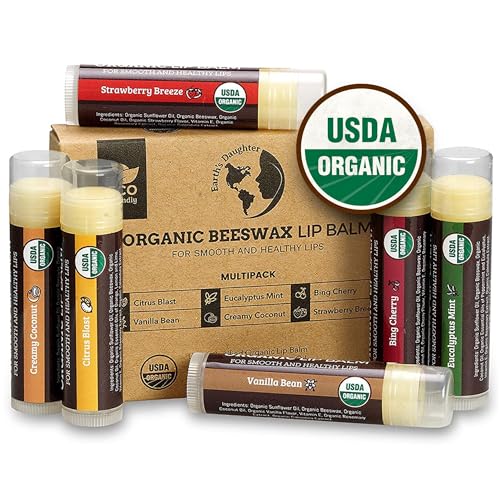
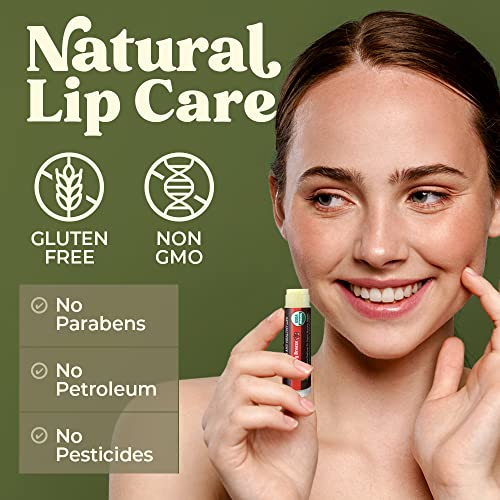

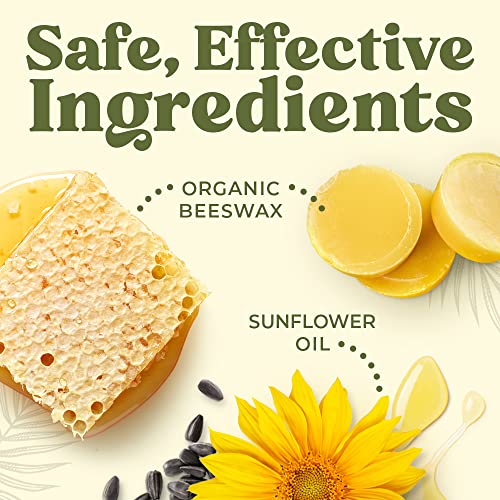
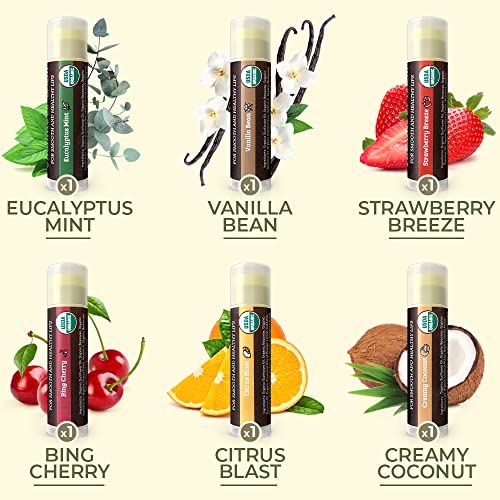
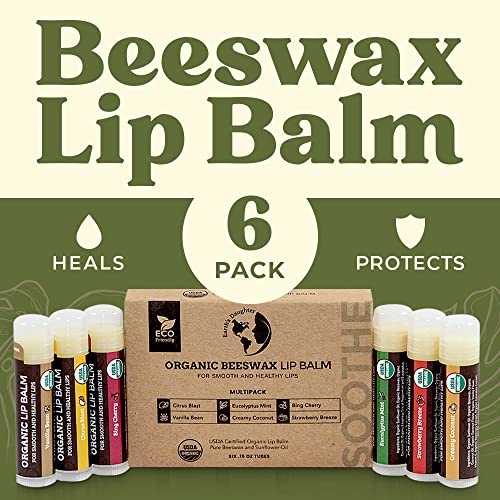
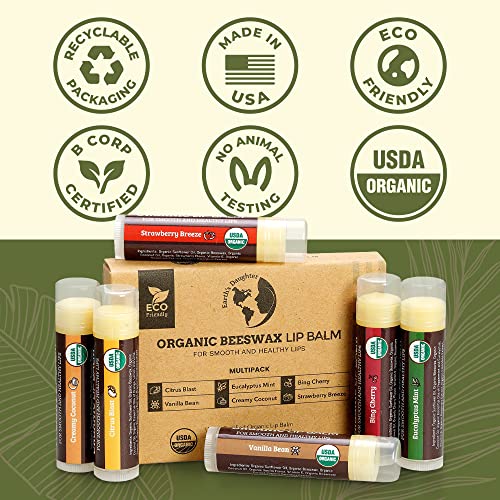
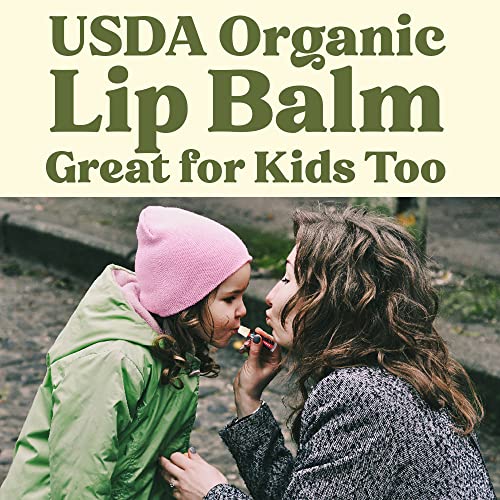
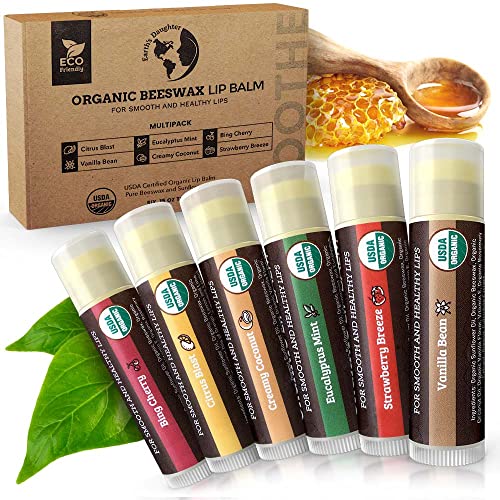
Earth's Daughter USDA Organic Lip Balm 6-Pack - Moisturizing, Non-GMO, Beeswax, Fruit Flavors


Eucalyptus Globulus (Eucalyptus) Leaf Oil
Medium RiskEucalyptus globulus leaf oil is a volatile oil derived from the leaves of the eucalyptus tree, primarily used for its aromatic properties and as a potential antimicrobial agent in various products.
Sustai Insights
Eucalyptus globulus leaf oil offers functional benefits like fragrance and potential antimicrobial properties, supporting product efficacy. However, it presents high allergenic potential and moderate irritation concerns, which may pose health risks. Environmental risks include possible pollution and bioaccumulation. Regulatory restrictions are in place regarding its use in certain products. Overall, the risk level is medium, necessitating caution in usage and consideration of alternatives like tea tree oil or peppermint oil.
Cocos Nucifera (Coconut)
Medium RiskCocos Nucifera, commonly known as coconut, is derived from the coconut palm. It is widely used in various cosmetic and personal care products for its moisturizing properties, acting as an emollient and skin-conditioning agent, enhancing texture and hydration.
Sustai Insights
Cocos Nucifera offers functional benefits such as effective moisturization and conditioning for the skin, while being biodegradable and often sustainably sourced. Health risks are minimal, with low concerns for carcinogenicity, allergies, and reproductive toxicity. Environmental risks are also low, as it does not accumulate in organisms or significantly pollute. Regulatory bodies do not impose restrictions, supporting its overall low-risk status. Safe usage practices include patch testing for sensitivities, though alternatives like shea butter or jojoba oil may offer similar benefits.
Orange
Low RiskOrange, derived from the fruit of the Citrus sinensis tree, is commonly used in various products for its aromatic properties and as a flavoring agent. It is often employed for its potential to enhance sensory appeal in food and cosmetic formulations.
Sustai Insights
Orange offers functional benefits such as flavor enhancement and fragrance in products. It is generally considered safe with low concerns regarding carcinogenicity, allergies, and reproductive toxicity. Environmental risks are minimal, as it does not significantly contribute to pollution or bioaccumulation. Regulatory bodies have no current restrictions on its use. Overall, orange is assessed to have a low risk profile, making it a viable option in formulations.
Helianthus Annuus (Sunflower) Seed
Low RiskHelianthus annuus (sunflower) seed is derived from the seeds of the sunflower plant and is commonly used in various cosmetic and personal care products. It serves primarily as an emollient and skin conditioning agent, providing moisture and enhancing the texture of formulations.
Sustai Insights
Helianthus annuus (sunflower) seed offers functional benefits, including skin conditioning and moisturizing properties, while being sustainably sourced and biodegradable. Health risks are minimal, with low concerns for carcinogenicity, allergies, and reproductive toxicity. Environmentally, it presents low risks of pollution or bioaccumulation. Regulatory assessments indicate no current restrictions. Overall, it is considered a low-risk ingredient, and safe usage practices should be maintained. Alternative ingredients may include other plant-based oils, but the sunflower seed oil remains a viable option.
Tocopherol, D Alpha
Low RiskTocopherol, specifically d-alpha tocopherol, is a naturally occurring form of Vitamin E. It is commonly used in cosmetic and personal care products primarily for its antioxidant properties, helping to protect formulations from oxidation and extend shelf life.
Sustai Insights
D-alpha tocopherol provides effective antioxidant benefits, contributing to product stability. It is sustainably sourced and generally regarded as safe, with low concerns regarding carcinogenicity, allergies, and reproductive toxicity. However, there are minor concerns about endocrine disruption. Regulatory bodies have not imposed significant restrictions, indicating low overall risk. Recommended usage practices include adhering to established safe concentration thresholds. Alternatives, such as other forms of Vitamin E or plant-based antioxidants, may also be considered.
Cherry
Low RiskCherry is a fruit commonly used in food products and cosmetics for its flavor and potential antioxidant properties. It may serve as a natural coloring agent and is often included for its fragrance in personal care formulations.
Sustai Insights
Cherry exhibits low health risks, with minimal concerns regarding carcinogenicity, allergies, or reproductive toxicity. Its environmental impact is also low, with no significant pollutant or bioaccumulation concerns. Regulatory bodies do not have restrictions on its use, indicating a favorable safety profile. Overall, cherry can be considered a low-risk ingredient, suitable for various applications.
Cocos Nucifera (Coconut) Oil
Low RiskCocos Nucifera (Coconut) Oil is derived from the kernels of the coconut palm. It is primarily used in cosmetic formulations for its emollient and moisturizing properties, making it suitable for skin and hair care products.
Sustai Insights
Coconut oil serves as an effective moisturizer and emollient, promoting skin hydration and softness. It is sustainably sourced and biodegradable. Health risks are minimal, with low concerns regarding carcinogenicity, allergens, and reproductive toxicity. Environmental impact is also low, as it does not contribute significantly to pollution or bioaccumulation. Regulatory bodies have not issued restrictions on its use. Overall, coconut oil presents a low risk for health and environmental concerns, making it a safe ingredient in cosmetic products.
Citrus Limon (Lemon)
Low RiskCitrus limon, commonly known as lemon, is a citrus fruit used primarily for its juice and zest. It is often included in personal care products for its astringent properties and as a natural fragrance. It is recognized for its potential antioxidant benefits and as a source of vitamin C.
Sustai Insights
Citrus limon offers functional benefits like acting as a natural preservative and providing fragrance in formulations. It is sustainably sourced and biodegradable. Health risks are considered low for carcinogenicity, allergies, and reproductive toxicity. Environmental risks are minimal, with no significant bioaccumulation. Regulatory status is favorable, with no current restrictions noted. Overall, this ingredient poses a low risk, making it a safe choice for consumers.
Gaultheria Procumbens (Wintergreen) Leaf Extract
Low RiskGaultheria procumbens (wintergreen) leaf extract is derived from the leaves of the wintergreen plant. This extract is commonly used in personal care products for its potential soothing properties and characteristic fragrance. It is often included in formulations for its aromatic qualities and may contribute to product stability.
Sustai Insights
Gaultheria procumbens leaf extract is recognized for its functional benefits, including soothing properties and pleasant scent. It is sustainably sourced and shows low health risk concerns, with negligible potential for carcinogenicity, allergies, or reproductive toxicity. Regulatory assessments indicate it is not currently restricted. Environmental impact appears minimal, with no significant pollution or bioaccumulation concerns. Overall, this ingredient is considered low risk, making it a suitable choice in formulations. For those seeking alternatives, other botanical extracts may provide similar benefits.
Orange
Low RiskOrange, derived from the fruit of the Citrus sinensis tree, is commonly used in various products for its aromatic properties and as a flavoring agent. It is often employed for its potential to enhance sensory appeal in food and cosmetic formulations.
Sustai Insights
Orange offers functional benefits such as flavor enhancement and fragrance in products. It is generally considered safe with low concerns regarding carcinogenicity, allergies, and reproductive toxicity. Environmental risks are minimal, as it does not significantly contribute to pollution or bioaccumulation. Regulatory bodies have no current restrictions on its use. Overall, orange is assessed to have a low risk profile, making it a viable option in formulations.
Helianthus Annuus (Sunflower) Seed
Low RiskHelianthus annuus (sunflower) seed is derived from the seeds of the sunflower plant and is commonly used in various cosmetic and personal care products. It serves primarily as an emollient and skin conditioning agent, providing moisture and enhancing the texture of formulations.
Sustai Insights
Helianthus annuus (sunflower) seed offers functional benefits, including skin conditioning and moisturizing properties, while being sustainably sourced and biodegradable. Health risks are minimal, with low concerns for carcinogenicity, allergies, and reproductive toxicity. Environmentally, it presents low risks of pollution or bioaccumulation. Regulatory assessments indicate no current restrictions. Overall, it is considered a low-risk ingredient, and safe usage practices should be maintained. Alternative ingredients may include other plant-based oils, but the sunflower seed oil remains a viable option.
Tocopherol, D Alpha
Low RiskTocopherol, specifically d-alpha tocopherol, is a naturally occurring form of Vitamin E. It is commonly used in cosmetic and personal care products primarily for its antioxidant properties, helping to protect formulations from oxidation and extend shelf life.
Sustai Insights
D-alpha tocopherol provides effective antioxidant benefits, contributing to product stability. It is sustainably sourced and generally regarded as safe, with low concerns regarding carcinogenicity, allergies, and reproductive toxicity. However, there are minor concerns about endocrine disruption. Regulatory bodies have not imposed significant restrictions, indicating low overall risk. Recommended usage practices include adhering to established safe concentration thresholds. Alternatives, such as other forms of Vitamin E or plant-based antioxidants, may also be considered.
Cherry
Low RiskCherry is a fruit commonly used in food products and cosmetics for its flavor and potential antioxidant properties. It may serve as a natural coloring agent and is often included for its fragrance in personal care formulations.
Sustai Insights
Cherry exhibits low health risks, with minimal concerns regarding carcinogenicity, allergies, or reproductive toxicity. Its environmental impact is also low, with no significant pollutant or bioaccumulation concerns. Regulatory bodies do not have restrictions on its use, indicating a favorable safety profile. Overall, cherry can be considered a low-risk ingredient, suitable for various applications.
Eucalyptus Globulus (Eucalyptus) Leaf Oil
Medium RiskEucalyptus globulus leaf oil is a volatile oil derived from the leaves of the eucalyptus tree, primarily used for its aromatic properties and as a potential antimicrobial agent in various products.
Sustai Insights
Eucalyptus globulus leaf oil offers functional benefits like fragrance and potential antimicrobial properties, supporting product efficacy. However, it presents high allergenic potential and moderate irritation concerns, which may pose health risks. Environmental risks include possible pollution and bioaccumulation. Regulatory restrictions are in place regarding its use in certain products. Overall, the risk level is medium, necessitating caution in usage and consideration of alternatives like tea tree oil or peppermint oil.
Cocos Nucifera (Coconut) Oil
Low RiskCocos Nucifera (Coconut) Oil is derived from the kernels of the coconut palm. It is primarily used in cosmetic formulations for its emollient and moisturizing properties, making it suitable for skin and hair care products.
Sustai Insights
Coconut oil serves as an effective moisturizer and emollient, promoting skin hydration and softness. It is sustainably sourced and biodegradable. Health risks are minimal, with low concerns regarding carcinogenicity, allergens, and reproductive toxicity. Environmental impact is also low, as it does not contribute significantly to pollution or bioaccumulation. Regulatory bodies have not issued restrictions on its use. Overall, coconut oil presents a low risk for health and environmental concerns, making it a safe ingredient in cosmetic products.
Citrus Limon (Lemon)
Low RiskCitrus limon, commonly known as lemon, is a citrus fruit used primarily for its juice and zest. It is often included in personal care products for its astringent properties and as a natural fragrance. It is recognized for its potential antioxidant benefits and as a source of vitamin C.
Sustai Insights
Citrus limon offers functional benefits like acting as a natural preservative and providing fragrance in formulations. It is sustainably sourced and biodegradable. Health risks are considered low for carcinogenicity, allergies, and reproductive toxicity. Environmental risks are minimal, with no significant bioaccumulation. Regulatory status is favorable, with no current restrictions noted. Overall, this ingredient poses a low risk, making it a safe choice for consumers.
Gaultheria Procumbens (Wintergreen) Leaf Extract
Low RiskGaultheria procumbens (wintergreen) leaf extract is derived from the leaves of the wintergreen plant. This extract is commonly used in personal care products for its potential soothing properties and characteristic fragrance. It is often included in formulations for its aromatic qualities and may contribute to product stability.
Sustai Insights
Gaultheria procumbens leaf extract is recognized for its functional benefits, including soothing properties and pleasant scent. It is sustainably sourced and shows low health risk concerns, with negligible potential for carcinogenicity, allergies, or reproductive toxicity. Regulatory assessments indicate it is not currently restricted. Environmental impact appears minimal, with no significant pollution or bioaccumulation concerns. Overall, this ingredient is considered low risk, making it a suitable choice in formulations. For those seeking alternatives, other botanical extracts may provide similar benefits.
Cocos Nucifera (Coconut)
Medium RiskCocos Nucifera, commonly known as coconut, is derived from the coconut palm. It is widely used in various cosmetic and personal care products for its moisturizing properties, acting as an emollient and skin-conditioning agent, enhancing texture and hydration.
Sustai Insights
Cocos Nucifera offers functional benefits such as effective moisturization and conditioning for the skin, while being biodegradable and often sustainably sourced. Health risks are minimal, with low concerns for carcinogenicity, allergies, and reproductive toxicity. Environmental risks are also low, as it does not accumulate in organisms or significantly pollute. Regulatory bodies do not impose restrictions, supporting its overall low-risk status. Safe usage practices include patch testing for sensitivities, though alternatives like shea butter or jojoba oil may offer similar benefits.
Experience the soothing power of Earth's Daughter USDA Organic Lip Balm 6-Pack, featuring delicious fruit flavors to nourish and protect dry, cracked lips. Crafted with care, this lip balm is perfect for the whole family and combines the richness of organic ingredients with environmental responsibility.
- Delicious Flavors: Indulge in six delightful flavors—Vanilla Bean, Creamy Coconut, Eucalyptus Mint, Bing Cherry, Citrus Blast, and Strawberry Breeze—that make lip care enjoyable for everyone.
- 100% Pure Ingredients: Formulated with Organic Sunflower Oil, Beeswax, Coconut Oil, and Vitamin E, ensuring your lips receive the best nature has to offer without harmful chemicals.
- USDA Organic Certification: Enjoy peace of mind knowing this product meets stringent USDA standards, guaranteeing non-GMO and chemical-free ingredients produced sustainably.
- Eco-Friendly Practices: Made in a B-Corporation certified facility, this lip balm supports eco-conscious manufacturing and features completely recyclable packaging.
- Versatile Uses: Ideal for chapped lips, as a lipstick base, or part of a thoughtful gift set, this moisturizer caters to all ages, making it a staple in every household.
Subscribe & Save with Sustai
- Best Price Guarantee: Always enjoy the lowest prices on sustainable home essentials.
- No Surprises: We’ll notify you before shipping. No hidden fees, ever.
- You’re in Charge: Change, pause, or cancel your subscription anytime with ease.
- Eco-Friendly Deliveries: Our grouped shipments mean less packaging and lower emissions.
Join us on a sustainable journey. Special offers for a limited time! Prices and promotions may change.
Recommended Products
Experience the soothing power of Earth's Daughter USDA Organic Lip Balm 6-Pack, featuring delicious fruit flavors to nourish and protect dry, cracked lips. Crafted with care, this lip balm is perfect for the whole family and combines the richness of organic ingredients with environmental responsibility.
- Delicious Flavors: Indulge in six delightful flavors—Vanilla Bean, Creamy Coconut, Eucalyptus Mint, Bing Cherry, Citrus Blast, and Strawberry Breeze—that make lip care enjoyable for everyone.
- 100% Pure Ingredients: Formulated with Organic Sunflower Oil, Beeswax, Coconut Oil, and Vitamin E, ensuring your lips receive the best nature has to offer without harmful chemicals.
- USDA Organic Certification: Enjoy peace of mind knowing this product meets stringent USDA standards, guaranteeing non-GMO and chemical-free ingredients produced sustainably.
- Eco-Friendly Practices: Made in a B-Corporation certified facility, this lip balm supports eco-conscious manufacturing and features completely recyclable packaging.
- Versatile Uses: Ideal for chapped lips, as a lipstick base, or part of a thoughtful gift set, this moisturizer caters to all ages, making it a staple in every household.

You can have at most 2 Sustainable Steals products in your cart
Customer Reviews
Customers’ View
Customers generally express satisfaction with the USDA Organic Lip Balm by Earth's Daughter, highlighting its moisturizing properties and pleasant flavor variety. Many users appreciate the natural and organic ingredients, noting that the balm effectively hydrates lips without the heaviness of traditional lip products. For instance, one customer remarked on the coconut flavor's exceptional hydrating qualities, stating it keeps lips supple throughout the night. While the majority of flavors received positive feedback, some users pointed out that the Vanilla Bean scent could be improved. Additionally, customers value the cruelty-free commitment and recyclable packaging, aligning with eco-friendly and health-conscious values. Overall, this lip balm is regarded as a reliable option for maintaining lip health in a natural and environmentally aware manner.
AI-generated from the text of customer reviewsThis product is rated 4.3 of 5.0 stars.
It has received 131 reviews.







